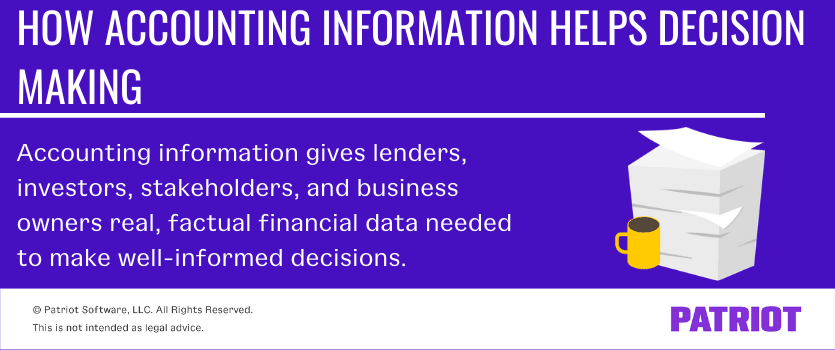Financial reports and accounting information may seem time-consuming or confusing. But, that data is an essential part of running a business—especially when you need to make big decisions. Do you need to take out a loan? Can you afford to give raises to your employees? What about buying new equipment? All of these questions can be answered by looking at your financial reports. So, how does accounting information help in decision making?
Accounting information and decision making
The relationship between accounting information and decision making is a two-way street. You (or someone else) cannot make decisions without all of the necessary accounting information. But, why are informed decisions so important? Because you need to know how much you have before you can spend or apply for loans.
Simply put, lenders, investors and stakeholders, and your accountant need to know what the information says before they can determine anything related to your business. Let’s take a look at some examples.

Lenders
Whether your business is just starting or you have decades under your belt, you may need to consider a business loan. How do you know if you should be looking into a loan? By taking a look at your accounting information, of course. But, how does a lender determine if they should give you a business loan? The lender needs your accounting information, too.
When financial institutions (e.g., banks) look to see your business’s creditworthiness, they need to know your financial information. Your financial data allows creditors to make decisions about how much money you qualify for to receive in loans. Or, the lender can decide that you do not qualify for a loan based on the information you provide.
If you’re not seeking a loan but need to apply for a business credit card, accounting information allows creditors to see if you qualify for a credit card.
What kind of accounting information do you need to give to lenders to help their decision-making process? Business financial information includes:
- Income statements
- Cash flow statements
- Business tax returns
- Balance sheets
Investors and stakeholders
If you’re a startup owner or just looking to take on investors to grow, you need to provide accounting information to any potential investors. Why? Accounting information helps investors or stakeholders make decisions about investing in your business.
How do investors use accounting information? And, how do stakeholders use account information? Stakeholders and potential investors use financial information to determine the value of your company. And, they use the data to perform a credit analysis.
How accounting information helps in decision-making for investors and stakeholders boils down to them seeing your company’s financial health. They can see where your financing sources are, calculate the profitability, and estimate any risks.
For example, investors and stakeholders may ask to see your company’s income statement. The line items detail any one-time and recurring income transactions to show if your income is consistent or sporadic. An investor may decide to move forward with investing in your business if your accounting information shows you have steady income.
Your bookkeeping may also show stakeholders that your business is a financial risk by showing potential losses over time. The role of accounting information in decision-making for investors is to inform them of potential risks and losses, as well as profits, if they provide you with capital.
Accountants
Accounting information for decision making is important for accountants because they can advise you in your own decision-making. Your accountant knows how to read your financial reports to understand the bigger picture of your books.
For example, you decide that your business needs a new computer for each of your 20 employees. The desktop computers you are considering cost $300 apiece. So, you need $6,000 to upgrade the computers at your office ($300 x 20 = $6,000). Before you decide to make an investment in new computers, consult with your accountant.
Your accountant reviews your general ledger to see if you have enough assets to purchase the computers. Or, they can advise if you need to take on a liability (e.g., a business loan) to cover the costs.
How do business owners use account information?
If your business does not need a lender, have investors or stakeholders, or use an accountant, you still need to understand how accounting information helps in decision making. Some of the reasons you need accounting information for decision making include:
- Creating budgets
- Hiring employees
- Downsizing your workforce
- Purchasing equipment
Accounting information gives you hard figures and data that you can use to make well-informed decisions. When you sit down to write your budget, the financial information for decision making needs to be up-to-date and complete.
Did you see a profit or a loss last year? Did the costs of goods increase or decrease? Is there a budget line item that can be removed or replaced with another line item that may be more profitable? Your accounting information can answer these questions.
If your budget is healthy and you have room to spend, you may decide that you can hire another employee or purchase more equipment. Some documents you need for budgeting include:
- Accounts receivable
- Accounts payable
- Beginning balances
- Balance sheet
- Profit and loss
Have the documents in front of you to use your accounting information for decision-making.
How accounting information system is helpful in decision making
Again, you need complete, accurate financial information to make a well-informed business decision. That includes loans, credit cards, investing, budgeting, and more. But, your accounting information is only as good as your recordkeeping. That’s where an accounting information system (aka accounting software) comes in.
Pen and paper, filing cabinets, and spreadsheets are handy tools to have, but are they the best tools at your disposal? Short answer: No. Let’s take a look at the long answer.
Using pen and paper can be a long, painstaking process. You have to go to the filing cabinet, root through all of your receipts and documents, compile them, and then write everything down. The longer you’re in business, the longer this process takes. Not to mention, that’s a lot of paperwork to have to carry around when you need to produce the documents. Your filing cabinet fills up fast.
So, what about spreadsheets? Spreadsheets are a good tool to have when you’re entering data and creating small reports or graphs. But once you get into needing more complex reports, it’s time to ditch the spreadsheets and bring out the big guns.
Online accounting software lets you log in anywhere to access your books on the fly. In some software, you can store receipts and documents digitally, reconcile your accounts, and pull a variety of reports with a few button clicks. You save time, which saves you money and gets you back to running your business. And, you can check the health of your books anytime you need to make a business decision without having to step foot in the office.
Ready to start making some business financial decisions and need easy reporting? Patriot’s accounting software lets you sign in and record information from anywhere you are. Simply log in, enter your data, download your reports, and go back to doing what you love most. Try it free for 30 days!



